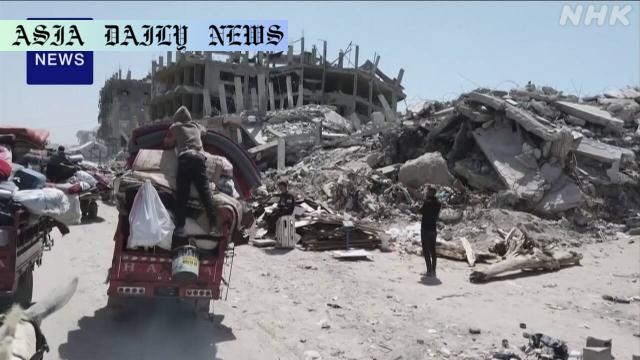Gaza Humanitarian Aid: The head of the GHF resigns, citing failure to uphold impartiality and independence amidst intense Gaza conflict.

Unfolding the Crisis in Gaza
The Gaza Strip continues to witness unimaginable suffering as conflicts have deeply impacted the region since October 2023. Amidst the ongoing calamity, efforts to deliver humanitarian aid have been plagued by political and operational challenges. Among these, a recent development involving the US-backed Gaza Humanitarian Foundation (GHF) has raised alarms globally. The organization’s initiative to distribute aid in Gaza, under a framework specifically designed to prevent resources from reaching Hamas, has been criticized even before its operations could fully commence. Political constraints, coupled with the resignation of GHF’s head, have brought the challenges to the forefront yet again.
GHF’s Aid Operations: A Noble Cause in Turmoil
Launched on Monday to ease the humanitarian crisis in Gaza, the GHF aimed to provide critical supplies while ensuring the resources remained neutral in the region’s politically charged environment. Reports indicated this was achieved through private backing and other vetted entities, enabling a rigorous distribution mechanism. However, cracks in the strategy emerged when the organization’s leader stepped down abruptly, citing the inability to adhere to core humanitarian tenets like impartiality and independence. This development casts doubt over the intentions behind such efforts, particularly when UN-backed aid systems, known for their transparency, face significant criticism and obstacles from local authorities.
Mounting Criticism from the Global Community
The United Nations, which has decades of expertise in delivering aid to conflict zones like Gaza, voiced its concerns over the GHF model. According to the UN, the establishment of newer mechanisms, such as those employed by GHF, disrupts the functioning of well-established distribution systems. At the same time, efforts by the Israeli government to maintain control over resources highlight the ongoing power struggle that significantly hinders effective humanitarian relief. Adding to this, humanitarian groups have expressed anger at the increasing politicization of aid activities.
A Region Struggling for Survival
While these operational disputes continue, the people of Gaza bear the brunt of the situation. Reports citing local health authorities reveal a grim picture. Over 54,000 lives have already been claimed by the intensifying conflict, leaving tens of thousands injured and displaced. The lack of access to essential resources has devastated the region – food, water, and medical supplies remain scarce, with children and elderly people being the most vulnerable. Sadly, humanitarian efforts, which should have been a beacon of hope during such a crisis, now find themselves mired in inefficiency and disagreement.
The Need for a Unified Approach to Aid Delivery
The scenario unfolding in Gaza is a pressing reminder of the need for a unified and transparent approach to humanitarian relief. Entities involved in the distribution of aid must prioritize the welfare of the population over political allegiances. The resignation of GHF’s head, founded on the organization’s perceived deviation from humanitarian principles, underlines the urgent need to address loopholes within the current mechanisms. On the global stage, the UN and other aid organizations must reassess their strategies to ensure effective and impartial distribution in high-conflict zones.
Commentary
The Disruption of Hope Amidst Crisis
The resignation of the GHF leader is a stark reminder of the challenges facing global humanitarian assistance in politically charged environments. It saddens me profoundly to see such noble initiatives crumble under the weight of operational hurdles and political pressures. The very fact that the organization, ostensibly built to provide relief without bias, found it impossible to adhere to its core principles reflects the deeply intertwined politics of the region. Every missed opportunity in aid delivery signifies yet another family going to bed hungry, another child succumbing to preventable illnesses, or another life lost unnecessarily.
Bridging the Gap Between Aid and Politics
What this situation demands is a paradigm shift in how we approach humanitarian endeavors in volatile areas. Instead of creating isolated systems of assistance, governments, private entities, and global organizations must collaborate to strengthen pre-existing mechanisms. This ensures not only impartiality but also efficiency in reaching those in immediate need. The criticism from the UN further solidifies this stance – when seasoned organizations are undermined, the consequences fall directly on the vulnerable. An effective, sustainable model can only emerge when we recognize that humanitarian work transcends political and territorial disputes.
The Ethical Responsibility of Aid Providers
The resignation of the GHF leader, citing the inability to remain impartial, speaks volumes about the ethical dilemmas faced by those overseeing relief operations. Upholding humanity in its purest form must remain the cornerstone of humanitarian initiatives. The Gaza crisis is a litmus test for how the global community perceives and prioritizes the basic rights of civilians over political gains. Moving forward, leaders and organizations must bear the ethical responsibility that comes with their roles – anything less risks worsening an already dire humanitarian catastrophe.


